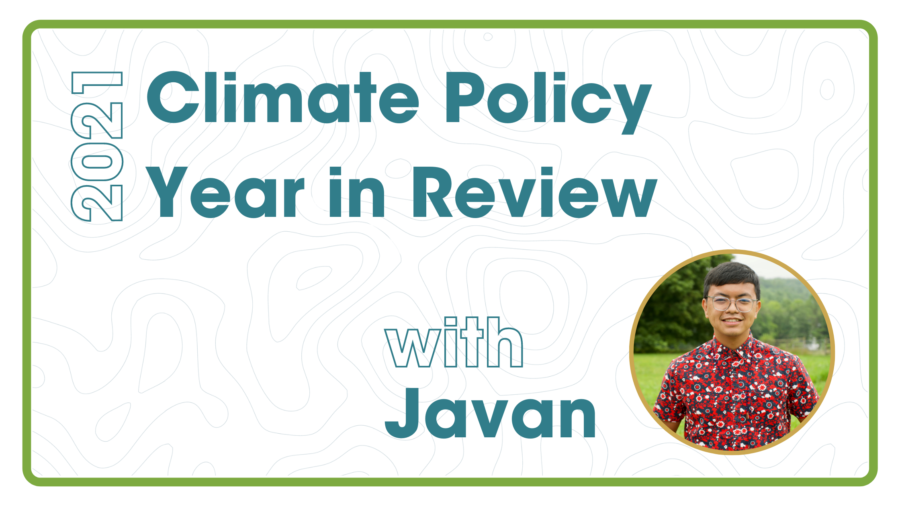2021 Climate Policy Year in Review
By TCI Policy Manager Javan Santos
Hi! I’m Javan, the Policy Manager at TCI. My job is to break down policy so that young climate advocates can understand it in order to push their advocacy even further! I’m breaking down some of my top picks for climate policy wins in 2021. I’ll be talking about five policies from different states and how they contribute to the overall efforts of addressing the climate crisis through policy. Check out the video below where I talk about each of these policies!

LD 99 Phasing Out Fossil Fuels from Pensions
One of the biggest accomplishments this year in terms of state climate policy came from the state of Maine, the state where The Climate Initiative started. On June 16th of this year, Governor Mills signed into law LD 99, which sets to phase out the state’s pension system from the fossil fuel industry. This is a huge win for a couple reasons:
- Not many people think about the connection between retirement and fossil fuel, but it is quite possible that you or your parents retirement funds might be providing funds to the fossil fuel industry. After 2026, Maine’s governmental retirees will not be doing so.
- The bill’s sponsor is also changing the narrative on fossil fuels, calling them “financially risky investments.” As the climate crisis continues to be felt by communities around the world, this policy decision to divest may not only be seen as an environmental choice, but also a financially practical one.

The California China Climate Institute
The next law comes out of California, and might pique the interest of anyone interested in international relations. This law codified the California-China Climate Institute and was signed into law in September of this year.
- It creates a partnership between the UC schools and Tsingchua University where they will collaborate on research and share findings in order to better understand climate change.
- This is especially interesting because we learn in school that the federal government is the one that represents the country in the international arena, but states that are climate leaders like California have found this as a successful way to place themselves in the international community, especially when climate policy faces challenges on the federal level.
Maryland HB 70 Energy Efficiency, Net Zero Homes
House Bill 70 provides solutions to the ways climate change affects underserved communities in Maryland. Passed in May of this year, it amends an already established law that requires the Maryland government to contract for net-zero homes.
- Requires preference for contracts be given to small, minority-owned, women-owned, and veteran-owned businesses.
- Allows different communities to be part of the solutions to climate change.
- Businesses will be able to provide their own cultural or personal context to these projects. More unique viewpoints will mean more solutions in different communities across the country!
Hopefully once some of these contracts begin, we will get to see a diverse set of businesses contributing to climate solutions.

Hawaii HB 243 & SB 474
Because I’m from the Pacific, I wanted to highlight a climate change related law that came from the Pacific, specifically from Hawaii. Hawaii’s economy relies heavily on their shores, and rising sea levels are threatening that. In July, two bills were passed:
- HB 243 requires state agencies to identify facilities that are susceptible to sea level rise and flooding.
- SB 474 requires anyone selling a home to disclose if the property is in a sea level rise exposure area.
Both of these bills are important because the climate crisis already impacts the tourism industry, which many islands are dependent on. Some elected officials worried this law would hurt Hawaii’s economy by lowering property values. But many are still unsure whether these beachfront luxury properties would be safe as the climate crisis worsens. Time will tell whether this policy will have any impact on how Pacific Island’s economies adapt to the climate crisis, but it’s a step in the right direction.

Colorado HB 21-1180
The last bill that passed into law this July in Colorado and is a decision that is hotly debated in climate spaces…
- Sets aside $2.5 million in grant funding to demonstrate the benefits of using biomass as opposed to fossil fuels.
- This concept is something that I think a lot of climate activists should be watching out for and research individually.
- Proponents of the policy argue that biofuels, which is burning trees, plants and other biomatter, captures carbon while fossil fuels do not, making them a preferred energy source. Opponents will argue, however, that the captured carbon is still released while burning the biofuel and that renewable energy is still the cleanest alternative. Either way, this bill hopes to encourage cleaner forms of fuel and we will have to wait and see what type of projects come from these grants.
Advocating for climate solutions can be very frustrating and it’s easy to get jaded doing this type of work. We tend to look at the larger scale solutions and are frustrated that the change we know is necessary is not coming fast enough. I wanted to highlight some of the important and impactful climate policies passed this year as a way to let young climate advocates know that change is happening. These smaller wins will help build the momentum we need for change at higher levels of government and policy. Laws similar to the ones I mentioned could be passed in other states, and with that comes momentum and a message to national and international leaders that we are ready for wide ranging solutions. I hope that while we acknowledge and continue to push leaders further, we can also take the time to celebrate small victories and use them to energize us in the work to solve the climate crisis.
